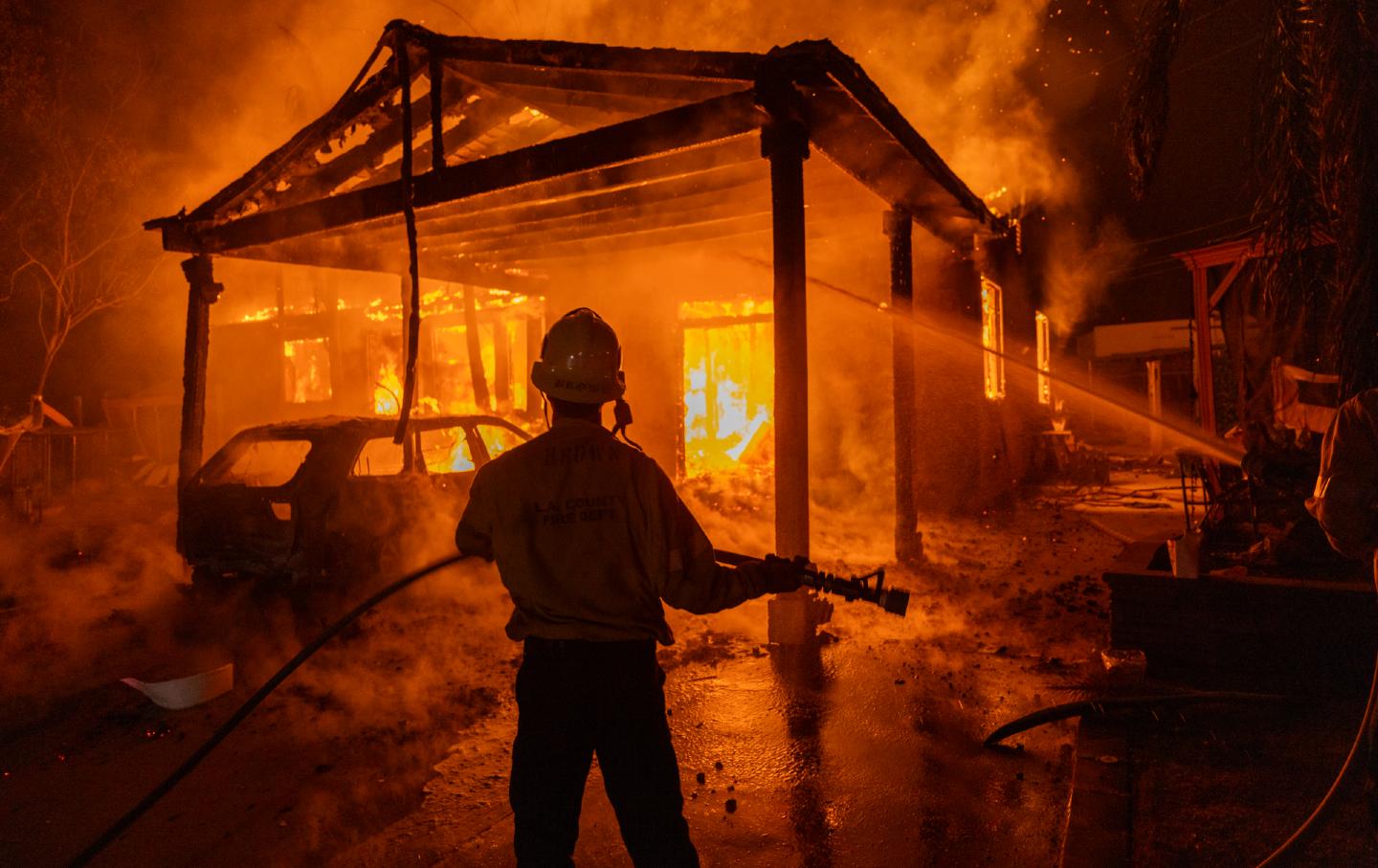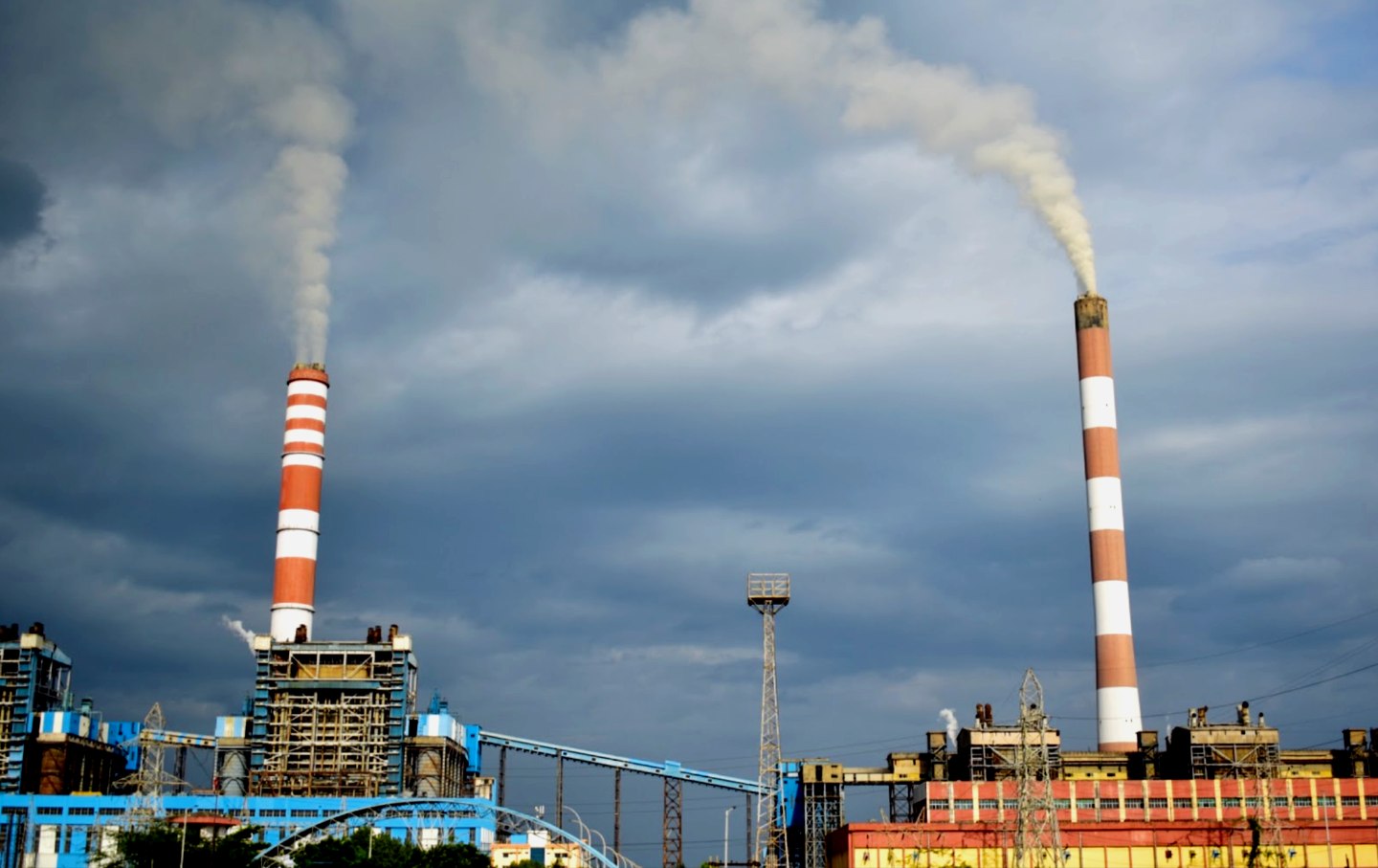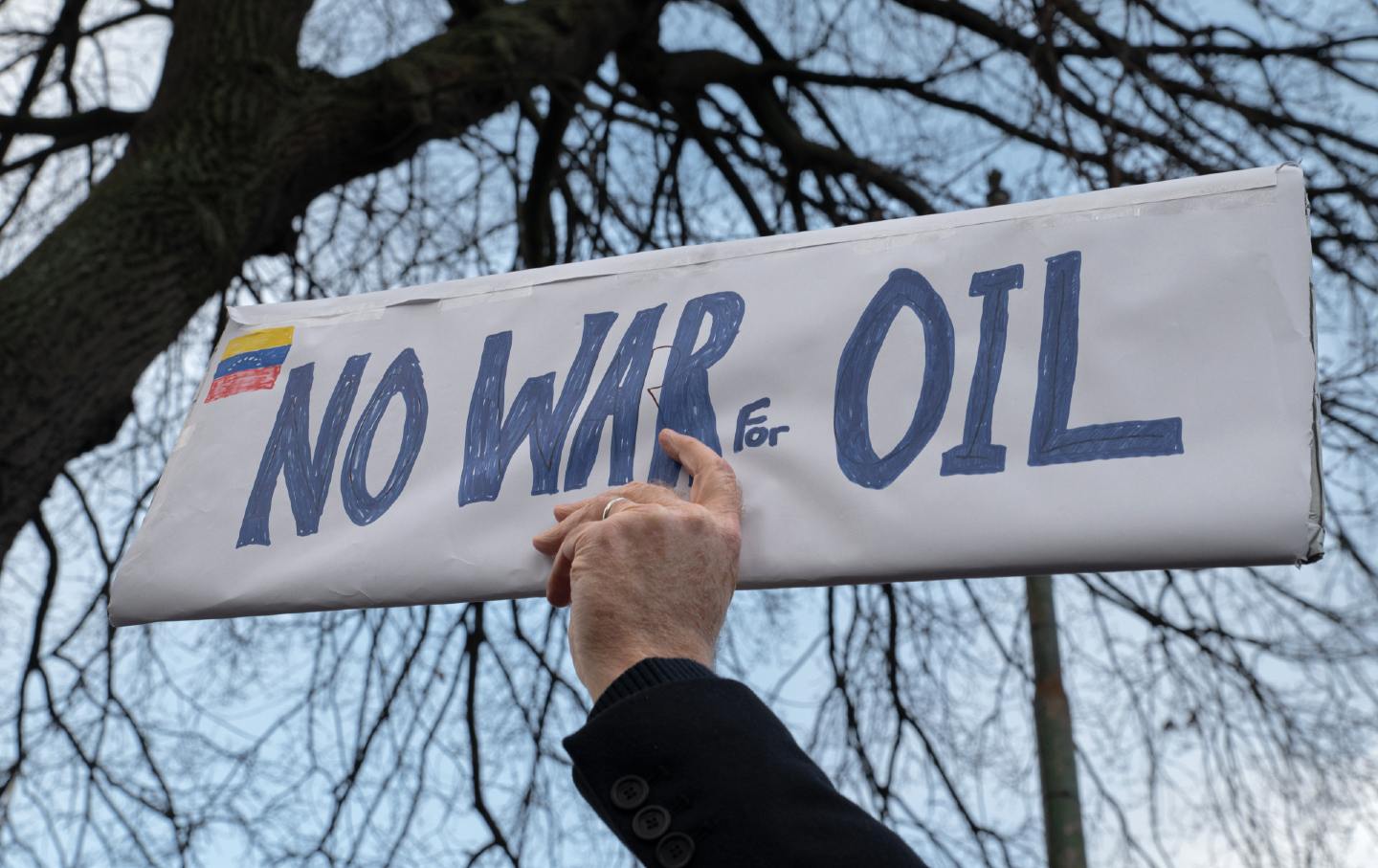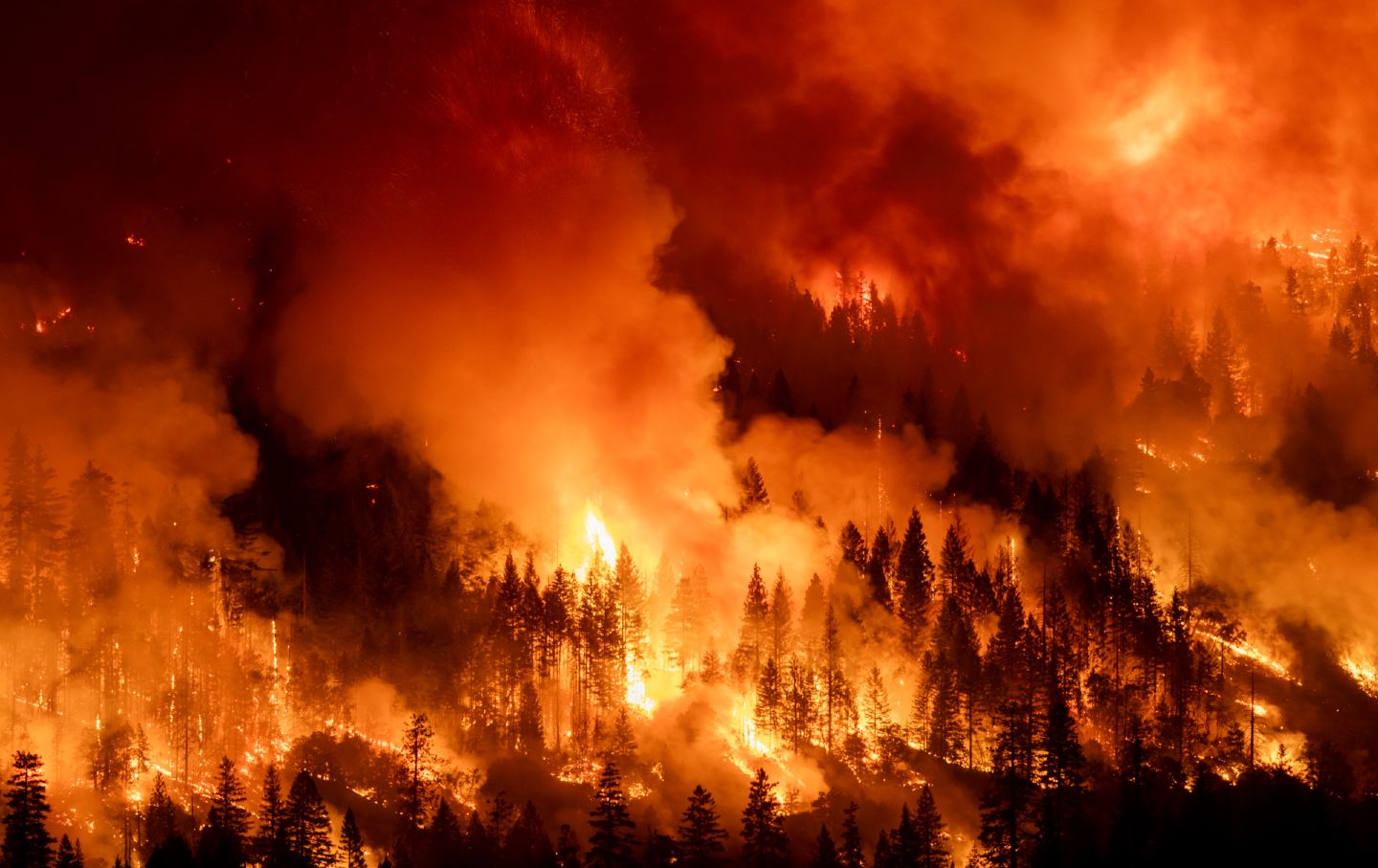In Our New Climate Reality, There Is No Getting Back to Normal
The media is failing to warn us about the scale of the disasters that lie ahead. In Los Angeles, as everywhere, we need more than liberal technocratic tweaks.
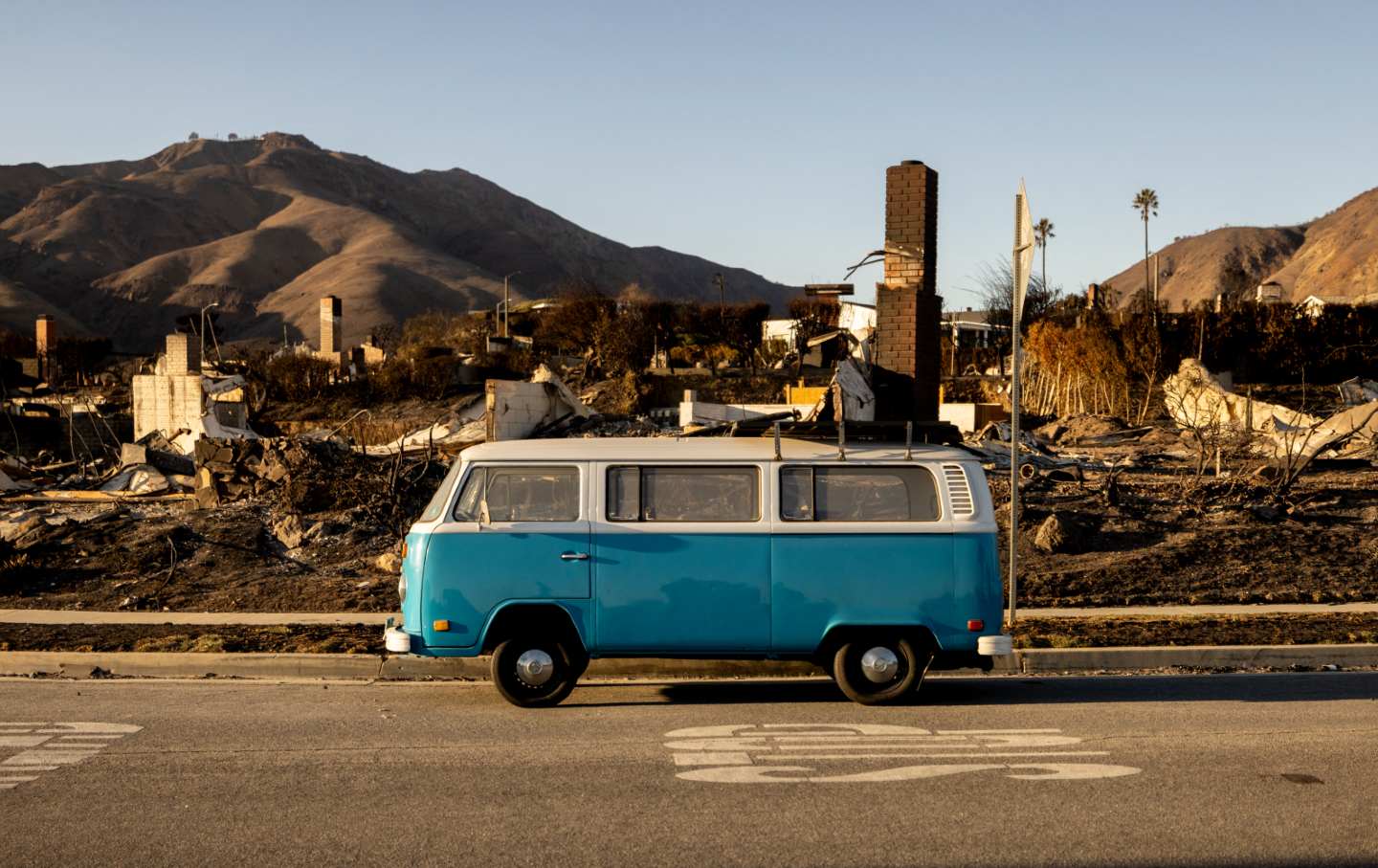
A blue Volkswagen van sits intact on a street amid homes destroyed by the Palisades Fire in Malibu, California, on January 15, 2025.
(Etienne Laurent / AFP via Getty Images)
“We are on the brink of an irreversible climate disaster. This is a global emergency beyond any doubt.… We are stepping into a critical and unpredictable new phase of the climate crisis.”
So begins the latest “State of the Climate Report” by an international group of 14 leading climate scientists from the United States, Europe, Australia, China, and Brazil, declaring in no uncertain terms that we have entered what’s coming to be known as the Age of Consequences. “Despite [half a century of] warnings, we are still moving in the wrong direction; fossil fuel emissions have increased to an all-time high,” the scientists report. “We are witnessing the grim reality of the forecasts as climate impacts escalate, bringing forth scenes of unprecedented disasters around the world.… We find ourselves amid an abrupt climate upheaval, a dire situation never before encountered in the annals of human existence.”
You might think the harrowing scenes of Los Angeles burning would elicit a similar reckoning in our national conversation, but almost nothing resembling those stark, factual, and, yes, alarming sentences will be found in the pages of our august organs of elite opinion. Rather than such clear language about our global emergency—the all-important context in which LA’s situation must be understood—the mainstream response has largely sought to contain the wildfire narrative within an Overton window of acceptable, i.e., unalarming, discourse. Much of the media is treating LA’s tragedy as extraordinary, yes, and somehow related to climate change, but ultimately manageable and preventable—if only smarter state and local policies and protocols are implemented.
I grew up next door to Altadena, California, in the foothills of the San Gabriel mountains. I have old friends in the evacuation zones and family members who live in other high-risk areas of Southern California—and as a SoCal native, the scenes of destruction and loss have been especially hard to watch. But as a veteran climate journalist, it’s equally hard to watch the national response. It’s a clarifying moment, in all the worst ways, as we witness our political and media culture stumbling headlong into the era of climate consequences, the dreadful harvest of 30-plus years of denial, obstruction, delay, and centrist greenwashing.
There’s much to be said and debated about what this new era means for the climate movement, the left, and any hope of climate justice in the near and long term. But right now, the most frightening responses are from the right and center: from the lurid conspiracy-minded lies and ecofascist scapegoating by Trump, Musk, and MAGA-sponsored media to the hapless, incoherent liberal center that downplays the climate emergency while offering no remotely commensurate plan for combating either fascism or climate breakdown.
Many of us have warned for years of a rising ecofascist threat in response to climate chaos. As the indispensable climate-movement elder statesman Gus Speth has recently reminded us, it’s not only the physical impacts—the droughts, fires, storms, and floods—but the social and political knock-on effects of global heating that will destabilize countries and make the already epic task of ending fossil fuels all but insurmountable.
But to speak in such terms—the “alarmism” of climate scientists and sober experts—places one well outside the boundaries of respectable opinion, where the question of climate in the LA story, if it gets more than passing mention, is reduced to pinning down the precise increment of its role in these particular fires. Yes, we’re told, the wildfires in California are getting bigger, more intense, and more frequent; yes, greater resilience must be factored into the rebuild and lessons must be learned about firefighting and prevention; but to treat it as anything more than a natural disaster would mean thinking outside the template of what is deemed politically feasible, which is to say, the only template allowed. With the right kind of effort, the political conditions can be changed. Physics and chemistry cannot. A new era of catastrophic climate consequences—fast approaching if not already reaching irreversible tipping points—requires a radically new template.
Indeed, in his 2024 book, Radical Adaptation: Transforming Cities for a Climate Changed World, Brian Stone Jr., the director of the Urban Climate Lab at Georgia Tech, argues for precisely that. Providing a rigorous set of principles for what cities can do to address ever more extreme heat, droughts, flooding, and wildfires, Stone argues that “strategies once perceived as socially untenable will need to be embraced.” Prominent among those strategies is “planned retreat within cities,” an approach, he notes, that challenges “our most deeply held beliefs” about the permanence of our built environments. “With a reframing of these beliefs,” Stone argues, “what may seem radical becomes fundamental: Retreat is the first step not the last.”
“When understood as one element in an interdependent framework for adaptation,” rather than as flight or abandonment, Stone suggests, “retreat is not a threat to the life of a community but a central pillar of its continuation.”
More of the LA Fires:
And yet when such bastions of right-thinking centrism as The Atlantic and The Washington Post single out the crisis in California’s home insurance market, the implication is that this is a pressing but conventional kind of problem to be solved with enlightened market reforms. The Post editorial board pays diligent lip-service to climate change as a causal factor, but without any acknowledgement of the trajectory we’re on and what it means for California’s future, whether any market-based insurance system will be sustainable as conditions deteriorate. The Atlantic’s coverage, aside from that of climate reporter Zoë Schlanger (safely siloed in the website’s Planet vertical), has been bizarrely reticent thus far about the larger climate context, preferring instead to zero in on the minute specifics of these particular fires, their psychological effects, and how to rebuild Pacific Palisades to withstand what have become (as Schlanger, from her climate silo, inconveniently points out) “unfightable” fires. The cognitive incoherence makes my head hurt.
To be fair, this kind of incoherence is hardly confined to the above examples. When not chasing the dark antics of the Trump-Musk shit show, the mainstream conversation is fixated on these same issues: in short, how to get back to normal and maintain the city, and the life, Angelenos have known. As if the record heat, droughts, and wildfires won’t keep on getting worse with each fraction of a degree of warming, rendering today’s “resilience” obsolete. As if communities at the wildland-urban interface aren’t already uninsurable against unfightable fires, requiring a massive public intervention. As if some kind of retreat, planned or otherwise, won’t be necessary—as it already is in places like coastal Florida and across large swaths of the planet, most disastrously in the Global South, where the conditions of life are fast becoming untenable and the capacity to relocate, rebuild, and adapt is all but nonexistent. As if this “new normal” of climate extremes isn’t itself a fleeting moment on the fossil-fueled way to uninhabitability.


